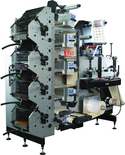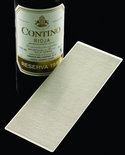Spend and save
13 April 2010These days, frugality is a virtue, but strategic spending on expansion and for commercial gain continues apace. Joanne Hunter reports.
Whether it’s buying a company or investing in more efficient technology, label converters are pressing on with plans for growth and market diversification.
Filtrona’s Coated & Security Products (CSP) Division significantly expanded its label capability when it acquired BP Labels (BP) in March 2010. The Welsh manufacturer of high quality, self-adhesive labels serves the pharmaceuticals, healthcare, cosmetics and food and drink markets, and its products are often used as part of authentication measures. Clearly, the two business units fit well together as they prepare to strike out across the world exploring combined opportunities.
“The acquisition is consistent with our vision to be the premier provider of creative and secure packaging, identity and security solutions to our customers and markets of choice,” says Tony Edwards, CSP’s divisional managing director.
Mutual advantages lie in CSP’s global commercial and operational footprint, which will access new markets for BP’s products; while BP’s customers will be offered packaging and security products and technologies from the well-known names of Payne Tear Tape and Payne Security.
BP, under incumbent managing director Andrew Wood, will contribute to CSP’s activities in an increasing number of niche sectors. As Mr Edwards explains: “Tear tape features are a carrier of added value. The benefits follow through to laminates in the identification market and covers national ID cards, delegate badges for major events such as the Olympics, track and trace and authentication coding. In the past four or five years, we have developed our own proprietary system using smart pigments to give security measures interesting for brand owners and governments.”
He thinks there is more the companies can do together for existing customers in the tobacco, food and ID sectors, in labels for creative and security purposes.
“The merger has broadened the functional carrier to include labels for messaging and variable data. BP’s strength is in the pharmaceuticals and liquid food sectors where tear tape is not yet strong, but where it could be of value.”
Industry pundits recommend label converters to ‘go global’ and run their operations to be able to provide worldwide brands with consistent service in all their territories. Such a mission requires large, integrated businesses.
Tear tape is already in 130-plus countries; BP is UK based and in continental Europe. Consistency in label and tear tape products will continue to spread across the globe and happen ‘organically or by acquisition’, says Mr Edwards.
The best way forward for CSP was learnt through its history with BP.
“In partnership for two years, we found there was a limit to what we could do.” Mr Edwards says the enlarged division is looking to fulfill its ambitions where CSP is established, in the Americas, including Brazil, Indonesia and India, as well as in regions where Filtrona has a foothold. And the company intends to stick to its growth plans despite ‘troubled times’ in the global economy.
Bringing strengths in different product segments ‘under one roof’ is an attractive proposition to customers. “Especially in the security area, it is important to customers to have a single supplier,” comments Mr Edwards. There is demand for a ‘full service offering’ that includes line-side delivery and vendor managed inventory, which Tear Tape already has in place.
BP set up a gateway customer portal for following the progress of orders. Impressed by this, its new owner is inspired to follow suit. “It provides visibility of materials use, gives closeness with the customer and integrates the supplier into customer activity,” says Mr Edwards.
He praises BP Labels for being ‘ahead’ as a company: “Though small, it has big experience. Its beginnings lay in labels for pharma - it is certified to PS9000 for quality and standards, and founded on short run and fast turnaround. That’s great for us - and appealing to our customers in cosmetics and toiletries.”
For BP, being part of a well-connected group will drive employment and potentially lead to a doubling of output from Cardiff, Mr Edwards tells Converting Today.
“We are reassuring BP’s customers that they are part of the platform. We are a very good fit on the creative, security and ID sides.”
BP’s machinery strategy is based on Nilpeter and UV-flexo. It gives results ‘approaching litho quality’, which is required in security products that call for fine line reproduction; and also rotary silkscreen. BP commissioned a Nilpeter FA-4, servo driven, 8-colour press in 2008.
Olympus Labels recently reported introducing an 8-colour Nilpeter FA-4 and a second 4-colour FA-2500. Such a technological boost to production performance comes with a high price tag, but it delivers worthwhile payback in terms of quality, reliability and reputation.
‘Spend and save’ is a popular sell-line since frugality has become a virtue of a modern business model. Printing converters can make big savings by managing their consumption of printing ink. Rexson says it recently completed three UV ink-save installations for three different ink suppliers, in as many weeks.
One of the systems was installed on behalf of Paragon Inks into Universal Labels, a leading converter of self-adhesive labels and shrink sleeves in South Africa.
Rexson won the commission due to its work on long-standing ink minimisation programmes for global printers, says Amanda Jones, international sales manager for Paragon Inks.
Universal Labels now operates with full traceability of all pre-mixed inks, and full individual job histories covering print setup, ink usage and batch identification.
Gerhardt makes luxury affordable
Driving down the price to achieve high quality is among the aims of Gerhardt International. The worldwide supplier of rotary converting tooling has now given converters the means to economically produce ‘luxury’ labels for the wine, and other high-end markets.
Its new Texture Flexi die embosses high quality textures on labels. According to Gerhardt, traditional embossing using solid dies is more costly and less flexible. Gerhardt’s method is said to ‘significantly’ reduce set-up time of the label printing machines.
The latest chemical milling processes ‘allow even thin lines and the smallest patterns and details to be embossed on the label to the specific customer requirements’.
Plants in the UK, Denmark, Poland, the USA and Australia, Gerhardt meet ‘all the converting challenges on a global scale’.
Track and trace
Equipment for on-demand labelling can link every individual transaction to system to provide transparency and traceability. Users may look forward to increased efficiency and operational time savings, with resulting cost-cutting benefits.
“We are seeing a great demand for robust, portable printers in the transport and logistics sector. Many logistics service providers are automating their paper-based processes and need quick and reliable technologies for creating barcode and RFID tickets,” observes Christian Bischoff, regional general manager EMEA at Datamax-O’Neil.
‘On the go’ compact label printers can be used in delivery vehicles and forklift trucks in addition to narrow store rooms. Datamax-O’Neil’s says its MP series is designed for extreme conditions.
Cost effective press
Edale’s goal to be ‘cost effective and creative’ has produced the Alpha Multi flexo press, able to print up to nine colours with a footprint of just 5m2. With a ‘unique’ twin stack arrangement, one stack can be in production while the second stack is being made ready.
It has the same short web path and quick job change as the original Alpha and offers the benefits of a modular machine ‘at a fraction of the price’. It is available as an upgrade to an original Alpha or as a standalone press.
Martin Jackson, director of Kingfisher Labels, which purchased the first Alpha Multi, says: “Its ability to run a 5-colour or 9-colour thread-up, ensures minimum waste and allows maximum flexibility on existing projects.” In addition, it will help Kingfisher Labels offer capabilities for which future trends and production requirements will create a need.
Multilayer labels ‘without limits’
Multilayer labels solve the need for more content space and peel back cleanly with no adhesive residue to a hinge, exposing more layers for content. The label can then be resealed.
Narrow web flexographic printing presses are used to make multilayer labels ‘in masses’ and the servo infeed process is the key to ‘making them easily without limits’, says Joe Nicholson, president of US company Rotary Technologies,.
With the servo infeed process, the number of press colours automatically doubles because the top layer is pre-printed. The servo infeed allows the pre-printed layer to be automatically laminated in register to the base layer.
“The operator is only registering one web at a time while the servo infeed performs the complex task. Set-up waste and running waste are low, while press speeds are high. Even though the top layer is pre-printed, the total press time may be lower due to increased press speeds,” says Mr Nicholson.
A servo infeed can be used on every job, not only multilayer labels, to improve press register and cut material waste, he adds.
Gerhardt's Texture Flexi die embosses high quality textures. Gerhardt Edale's 'cost effective and creative' Alpha Multi flexo press. Edale External weblinksConverting Today is not responsible for the content of external internet sites.Filtrona Nilpeter Rexson Olympus Labels Datamax O'neil Gerhardt Rotary Rotary Technologies Edale



